 Do you know that feeling after a long, long drive, returning home from a far-away but great event? We are happy but exhausted from the white lines (and orange cones) on the Pennsylvania Turnpike, eyes bleary and body tense from navigating the late-night truck traffic. On the Indiana interstate, right before the Ohio line, a billboard offered a rest stop with chocolate “for the pain that is Ohio.” Yep, these long, tedious hours of flat Buckeye road offers time for thinking and talking.
Do you know that feeling after a long, long drive, returning home from a far-away but great event? We are happy but exhausted from the white lines (and orange cones) on the Pennsylvania Turnpike, eyes bleary and body tense from navigating the late-night truck traffic. On the Indiana interstate, right before the Ohio line, a billboard offered a rest stop with chocolate “for the pain that is Ohio.” Yep, these long, tedious hours of flat Buckeye road offers time for thinking and talking.
Beth and I had just gone through a two-day parent introduction at Calvin College in Grand Rapids, Michigan, while our youngest daughter experienced her Calvin freshman orientation. This Passport program was spectacular, with fabulous fun and food and helpful information. We learned about the history of the school, John Calvin’s French accent, saw brief video clips from scholars likes James K.A. Smith,and were reminded of the cosmic scope of Christ’s redeeming restoration project (and hence, the deeply integrated religious vision of teaching the arts and the sciences for God’s glory and our neighbor’s good.) I leaned over to Beth and said that I wanted to attend Calvin College!
On the long ride home I pondered my own faith development, my own college years decades ago, my frustration as a younger man wondering why those who seemed most fired up about the gospel seemed so disinterested in the world and its great hurts. In my mind I revisited our many years of meeting students, selling books, including books written by people we had met at the Calvin orientation, and how we still have—thank you, Jesus!—a glimmer of our old idealistic vision that we can in some ways change the world for the better as we nurture a Christian mind, grounded in a Biblical worldview, enabling us to make connections between our deepest convictions and the way we live.
Over a great dinner with with old friends in Grand Rapids, our friend observed that my book reviews usually carry a sense that reading matters, that books can make a difference, that we read with a purpose which includes social change. You who are our fans and friends share this commitment and I thought of all of you, our Hearts & Minds gang, as we took in all this energy that Calvin emitted. I thought of the campus ministry that we love, the CCO, whose slogan is “transforming college students to transform the world.” Right on!
Evangelical higher education has had a renaissance in recent years in scope and in spiritual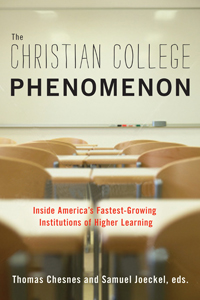 vision and most such faith-based liberal arts schools—Messiah, Eastern, Gordon, Taylor, Wheaton, Seattle Pacific, Geneva, John Brown, Westmont, Whitworth, George Fox, Hope, Houghton, Bethel, Dordt, Trinity Christian, Union, and so many others—have used the important language of vocation to help students realize that learning matters to God and that serving God in the workaday world is itself a holy calling, whether one is an insurance agent or a scientist, an artist or a school teacher. Learning about God’s world as a person with this luxury of being a student is itself a calling, and the college years are also preparatory for future service in Christ’s Kingdom, as young adults find their place in a career. This is how we change the world, taking institutions and career areas seriously and learning to be faithful followers of Christ in (but not of) those culture-shaping spheres.
vision and most such faith-based liberal arts schools—Messiah, Eastern, Gordon, Taylor, Wheaton, Seattle Pacific, Geneva, John Brown, Westmont, Whitworth, George Fox, Hope, Houghton, Bethel, Dordt, Trinity Christian, Union, and so many others—have used the important language of vocation to help students realize that learning matters to God and that serving God in the workaday world is itself a holy calling, whether one is an insurance agent or a scientist, an artist or a school teacher. Learning about God’s world as a person with this luxury of being a student is itself a calling, and the college years are also preparatory for future service in Christ’s Kingdom, as young adults find their place in a career. This is how we change the world, taking institutions and career areas seriously and learning to be faithful followers of Christ in (but not of) those culture-shaping spheres.
The Christian College Phenomenon: Insider America’s Fastest-Growing Institutions of Higher Learning edited by Thomas Chesnes & Samuel Joeckel (Abiline Christian University Press; $24.95) will be released early this fall and looks to be an extraordinary overview. Did you know that in just a few years a decade ago, enrollment at CCCU colleges rose over 70% while private and state school enrollment in those years role 3%? Wow. Editors Thomas Chesnes and Samuel Joeckel have taken an empirical
approach, surveying over 1900 professors at ninety-five CCCU colleges
and universities and 2300 students at twenty different schools. The
editors compiled responses to quantitative and open-ended questions on
topics from pedagogy and politics to faith learning integration; they
then made that data available to nearly thirty scholars who have turned
their considered responses into chapters that are now organized into
seven book sections, covering topics in gender, evolution, faith,
learning, scholarship, and race/ethnicity.
Do you hear shades of Abraham Kuyper in this interest in relating faith and cultural engagement, at least in how Calvin College expressed it to us this week? (I hope you recall the two- part BookNotes review of the new introduction to Kuyper by Richard Mouw, here and here.) That we are “called to holy worldliness” (in Mouw’s punchy phrase) as we think about how God has ordained the unfolding of various social spheres and commissions us to be agents of healing in those places? Indeed, some historians would say that the most vibrant Protestant Christian colleges have learned or re-learned recently to “think Christianly” about their own tasks and work, inside and outside of the classroom, in part by reflecting upon the way in which Calvin College talked about these things throughout the last half a century. That Calvin views itself (or so we gather) as neo-Calvinist and Kuyperian—that God in Christ is redeeming not just our souls but “every square inch” of the creation, and that our views of sociology and agriculture and aesthetics and politics are as important as our doctrine and theology—has been a model for integrating faith and scholarship from which other institutions have learned.
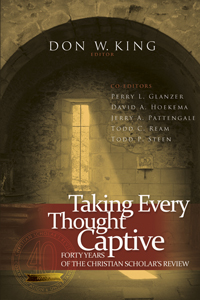 A brand new book—edited by an impressive team of scholars, including a former CCO staffer and Kuyperian from Hope College named Todd Steen (whose PhD in economics was taken at Harvard)—illustrates well the ways in which evangelicals have been wrestling with the questions of faith and learning, Christ and culture, piety and scholarship, for the last nearly half a century. Taking Every Thought Captive: Forty Years for the Christian Scholars Review, edited by the current editor of CSR, the literature professor Don King of the PC(USA) affiliated Montreat College along with Perry Glanzer, David Hoekema, Jerry Pattengale, Todd Ream and Todd Steen (Abilene Christian University Press; $25.00.) This thick book deserves a more thorough review later, but it is essentially a fantastic greatest hits collection of four decades of scholarly work done from within an intentionally Christian framework. (You know, even if you don’t have all of a band’s many releases, if you care at all you pick up the greatest hits album.) There are pieces here spanning the journal’s career and they are well selected. Some of them are really good to be in a book since the academic journal, CSR isn’t widely circulated outside of Christian colleges and they deserve to be read. What a wonderful opportunity to read through so many important articles! There are substantial essays by a wide array of scholars, from thinkers such as Nicholas Woltersdorff, Jonathan Chaplin, Richard Mouw, Mary Stewart Van Leuuwen, Roger Lundin, Nancy Ammerman, Dallas Willard, Stanley Hauerwas, Jenell Paris and many more. There are pieces on politics, on art, on the role of the Christian college, on student learning, on math and science and ethics and philosophy.
A brand new book—edited by an impressive team of scholars, including a former CCO staffer and Kuyperian from Hope College named Todd Steen (whose PhD in economics was taken at Harvard)—illustrates well the ways in which evangelicals have been wrestling with the questions of faith and learning, Christ and culture, piety and scholarship, for the last nearly half a century. Taking Every Thought Captive: Forty Years for the Christian Scholars Review, edited by the current editor of CSR, the literature professor Don King of the PC(USA) affiliated Montreat College along with Perry Glanzer, David Hoekema, Jerry Pattengale, Todd Ream and Todd Steen (Abilene Christian University Press; $25.00.) This thick book deserves a more thorough review later, but it is essentially a fantastic greatest hits collection of four decades of scholarly work done from within an intentionally Christian framework. (You know, even if you don’t have all of a band’s many releases, if you care at all you pick up the greatest hits album.) There are pieces here spanning the journal’s career and they are well selected. Some of them are really good to be in a book since the academic journal, CSR isn’t widely circulated outside of Christian colleges and they deserve to be read. What a wonderful opportunity to read through so many important articles! There are substantial essays by a wide array of scholars, from thinkers such as Nicholas Woltersdorff, Jonathan Chaplin, Richard Mouw, Mary Stewart Van Leuuwen, Roger Lundin, Nancy Ammerman, Dallas Willard, Stanley Hauerwas, Jenell Paris and many more. There are pieces on politics, on art, on the role of the Christian college, on student learning, on math and science and ethics and philosophy.
One piece that I have read and photocopied from the journal was a provocative and beautiful bit of writing by Brian Walsh and Steve Bouma-Prediger, using ecological insights based on a Scriptural vision of place and “homecoming” to suggest that students should know the places where they are studying. It was published in the review (along with a strongly-worded critique the following quarter) as they were writing their Beyond Homelessness, applying its insights about cultural displacement and Biblical exile to the experience of learning within the context of modernity. Brilliant! Another piece that I think should be widely discussed was by Ronald Sider who called in the CSR for more academically rigorous research that popularizes for the church the work of the academy and helps social reformers and activists to translate Christian thinking into policy initiatives. Again, this was a splendid piece that I highly recommend.
The Christian Scholars Review has long been an important organ for good book reviews and serious academic research done by scholars mostly within the mostly evangelical Protestant faith community. The special issues have been splendid (they did a C.S. Lewis issue a few years back, for instance) and it has regularly been a good testimony to the way our discipleship can effect our scholarship and cultural engagement. I wish there was a way for more libraries to stock it, certainly university libraries should, since they typically have journals from every other perspective one could possibly think of. Certainly any college professors that you know should hear about it. Maybe this book would be a way to introduce them to the important work of the journal.
Interestingly, after a few decades of pondering books like, say, Calvin College’s own Engaging God’s World: A Christian Vision for Faith, Living and Learning by Cornelius Plantinga (Eerdmans; $16.00) or the much-discussed Outrageous Idea of Christian Scholarship by George Marsden (Oxford University Press; $19.99) colleges from other theological traditions have had serious conversations about what their own unique theological heritages might offer to a perspective on being a Christian institution of higher learning. What does it mean that Baylor is Baptist (and not just Texan)? What is the unique contribution made by the constituency at Indiana Wesleyan? What role does Methodism play in shaping the teaching at Asbury in Wilmore KY? Besides having a peace studies program, is there anything uniquely Mennonite about the academic perspectives at Goshen? These are fascinating questions, being discussed with greater urgency these days, or so it seems.
(Sadly, most mainline denominational church-funded colleges have opted out of this conversation years ago and have no vision of being distinctively Christian or, in many cases, even faintly Christian; I know colleges funded by the tithes of United Methodists, Church of the Brethren, Lutheran, UCC and Presbyterians where professors robustly talk students out of religious faith. See the massive set of case studies in The Dying of the Light: The Disengagement of Colleges and Universities From Their Christian Churches by James Tunstead Burtchaell (Eerdmans; $49.99) for the history of the unhinging of church-related colleges from any substantive connection to the faith of the denominations that fund them.)


So, some evangelical colleges wanted to consider ways other than the Calvin College/Kuyperian approach. For instance, Douglas Jacobsen and Rhonda Hustedt Jacobsen and other Messiah College professors reflecting on their own Weslyan and Anabaptist heritage, published Scholarship and Christian Faith: Enlarging the Conversation (Oxford University Press; $45.00.) They suggest there, in fact, that the Kuyperian model, as exemplified by pioneers at Calvin or Dordt, shaped by wonderfully important scholars such as Nicholas Woltersdorff, George Marsden and Mark Noll, to name just three generative former Calvin College professors who are in the Christian Scholars Review anthology, had a bit of a hegemony in the conversations about what it looks like to relate faith and learning, to “think Christianly” to do a particular sort of Christian higher education. So they set out to tweak the conversation a bit, staking their ground. Duke ico
noclast Stanley Hauerwas compiled a collection of essays about higher education entitled The State of the University: Academic Knowledge and the Knowledge of God (Blackwell; $34.95) with one chapter which playfully wonders what it would look like If Wendell Berry ran a university.
Just a few months ago we were happy to get a fine book called The Heart of Higher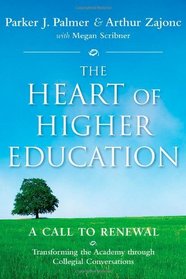 Education: A Call to Renewal by Quaker mystic Parker Palmer (Jossy Bass; $24.95.) You may know that he has long reflected on the meaning of knowing, the art of teaching, the nature of learning, the characteristics of authentic learning communities. (I just love his rumination To Know as We Are Known: Education as a Spiritual Journey; HarperCollins; $13.99.) It would be a large mistake to imply that Kuyperians have been the only ones who relate faith and learning or honor God’s commission to cultivate creation into sustainable cultural renewal. Almost everyone at most Christian colleges believe there is some way to integrate faith and the calling of higher education, although I have had conversations with students who have told me that their professors mock the ideal, even at evangelical colleges who affirm that God’s perspective will color all aspects of the curriculum and every area of life.
Education: A Call to Renewal by Quaker mystic Parker Palmer (Jossy Bass; $24.95.) You may know that he has long reflected on the meaning of knowing, the art of teaching, the nature of learning, the characteristics of authentic learning communities. (I just love his rumination To Know as We Are Known: Education as a Spiritual Journey; HarperCollins; $13.99.) It would be a large mistake to imply that Kuyperians have been the only ones who relate faith and learning or honor God’s commission to cultivate creation into sustainable cultural renewal. Almost everyone at most Christian colleges believe there is some way to integrate faith and the calling of higher education, although I have had conversations with students who have told me that their professors mock the ideal, even at evangelical colleges who affirm that God’s perspective will color all aspects of the curriculum and every area of life.
So, three cheers for widening the conversation.
I guess I’m a bit of a geek to care about these matters so much but we are convinced that anyone who cares about young adults (as most churches do) must attend to the questions about the meaning of higher learning, campus ministry and the need for reform of colleges and universities. These are the institutions that are forming many of our young adults and giving the direction for the rest of their lives. It is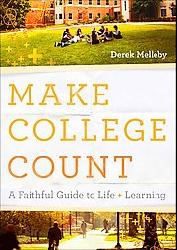 why we have been so adamant, begging you over and over even to start this conversation early by gifting Make College Count: A Faithful Guide to Life and Learning by Derek Melleby (Baker; $12.99) which in simple, clear ways invites high school or first year students to grapple with the bigger questions of why they are going off for their freshman year and what they think God thinks about it all. It is very, very good, and as we had our orientation extravaganza at Calvin College this week, I was glad Marissa had read it. Thanks, Derek, for caring about the so-called college transition in a way that has these larger themes in view. Thanks to those churches who ordered it from us, who wanted to give such a resource to their young members who are heading off to this new phase of their life journey.
why we have been so adamant, begging you over and over even to start this conversation early by gifting Make College Count: A Faithful Guide to Life and Learning by Derek Melleby (Baker; $12.99) which in simple, clear ways invites high school or first year students to grapple with the bigger questions of why they are going off for their freshman year and what they think God thinks about it all. It is very, very good, and as we had our orientation extravaganza at Calvin College this week, I was glad Marissa had read it. Thanks, Derek, for caring about the so-called college transition in a way that has these larger themes in view. Thanks to those churches who ordered it from us, who wanted to give such a resource to their young members who are heading off to this new phase of their life journey.
Even for those who don’t work in higher education, the “reformational worldview” embraced by Calvin and other Reformed colleges (see, at least, Creation Regained: The Biblical Basis for a Reformational Worldview by Al Wolters; Eerdmans; $14.00) has influenced many who work with students and it has been fruitful. I met a fellow father at the Calvin orientation, in fact, with a PhD from Wheaton College, who said it was one of the most important books he ever read! Indeed, may who work with undergrads at secular colleges or minimally church-related colleges that are largely secular in ethos, use books like The Outrageous Idea of Academic Faithfulness by Donald Opitz and Derek Melleby (Brazos; $13.99) or the many books on the Christian mind by James Sire or resources such as Os Guinness’ The Call (Nelson; $17.99) or Culture Making by Andy Crouch (IVP; $24.00). Each of these, in various ways, owes a debt to Kuyper and the movement of Christian scholarship exemplified at Calvin College that has rippled across North America and beyond. (What fun to see professor and pal William Romanowski’s Eyes Wide Open: Finding God in Popular Culture [Brazos; $21.00] on his office shelf in both Korean and Mandarin!) My own BookNotes reviews of Richard Mouw’s recent introduction (just a few weeks ago) to the thinking of Abraham Kuyper illustrates how this worldview-shaping theology that sees God’s hand in all the social institutions of God’s creation, reminds us of the Dutch legacy among many evangelical intellectuals and activists. Even older evangelical stalwarts of social reform such as Carl F. H. Henry (founder of Christianity Today in 1956) and Francis Schaeffer have noted that Kuyper and other Dutch theologians informed their intellectual texture and moderate endeavors for social reform.
That long drive home gave me time to think not only about our family’s new official relationship with this Dutch Reformed tradition, but with our own calling as booksellers, our vocation as cheerleaders of developing the Christian mind, and of how things have changed in the publishing world in recent decades. I guess you can be glad the drive wasn’t even longer or I might have ruminated even more…thanks for reading along.
*CINO, catapult, WORLD The HUSS SCHOOL
 





Before we started the journey home we made a stop in the small town of Three Rivers, Michigan, to visit the center of what I jokingly call the *cino empire. You may know that *culture is not optional is a loose network of writers, friends, artists, and social entrepreneurs, mostly younger folks who have drunk deeply from the Kuyperian social vision and have been influenced by radical thinkers at places like Dordt, Trinity Christian (Palos Heights) Calvin, Redeemer (in Ontario), ICS (the graduate school in Toronto), and the CCO. Besides running conferences and camp-outs, they publish catapult, a bi-weekly e-magazine which offers transformational memoir and poetry and excellent essays of faith-based cultural criticism. (They have an e-mailed daily asterisk quote that you can subscribe to as well, which is my daily shot of literature for subverting the Way Things Are.)
Rob and Kirstin Vander Giessen-Reitsma also run World Fare (with a crew of volunteers and interns) a beautiful fair trade store (not as flashy as the famous Ten Thousand Villages stores, but extraordinary for its personal touch and deep knowledge of the field of global fair trade economics and social vision entwined with a unique mission of intentionally embodying that vision into their local community ) If you are ever in South Eastern Michigan, World Fare is a marvelous, cozy place to visit.
interns) a beautiful fair trade store (not as flashy as the famous Ten Thousand Villages stores, but extraordinary for its personal touch and deep knowledge of the field of global fair trade economics and social vision entwined with a unique mission of intentionally embodying that vision into their local community ) If you are ever in South Eastern Michigan, World Fare is a marvelous, cozy place to visit.
The *cino folk embarked on a breathtakingly brazen leap of faith last year and started a capital campaign (not the sort of phrase that drops easily from the lips of neo-hippy social visionaries that run fair trade shops)
to buy an old, empty elementary school, a facility for which they have big plans. The Huss School is in need of major repairs and serious renovation but the community garden is already blooming, they have hosted concerts and art shows and for a year have been hosting an oral history project, collecting stories of those who once attended the school. (The ward where the school is located may be considered one of the more depressed parts of town and some the people of color who live there hold resentments for its closure decades ago. Kudos to Rob and Kirstin for doing “service learning” and hosting this opportunity for the neighborhood to name and renounce injustices of previous times so that they might move forward in grace and goodness.) Do visit their imagining space webpage and learn about their campaign to get folks to help them in their effort to renovate the Huss School.
So. This is important. The sort of worldviewish, deeply integrated, Christ-guided learning that goes on at places like Calvin College prompt some of their graduates to run for office or do medical research or get jobs as lawyers or filmmakers or speech pathologists. Yay. And some end up buying empty schools and dreaming of Isaiah 58:12 where it is promised that God’s people will be known for repairing the ruins of previous generations. Thank goodness that the past few decades have lead to such beautiful, serious, solid marks of discipleship.
JOHN STOTT
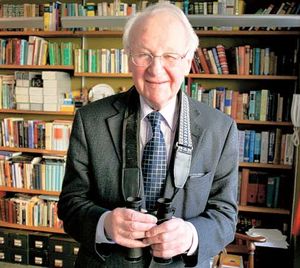 And then the sudden, bittersweet news of the death of John Stott. He was one of our era’s great Christian leaders, himself deeply involved in all of the sorts of things that have captured our hearts even this very week in Grand Rapids—caring for students, nurturing the Christian mind, thinking about the reform of institutions, relating to the global South and honoring our international relationships, serving the poor and marginalized out of a non-compromising Christ-centeredness. Stott was a British evangelical Anglican, Rector of All Souls in London, evangelist, author, a principle in the World Evangelical Fellowship, the Lausanne movement, and founder of the international social ministry, The Langham Partnership International.
And then the sudden, bittersweet news of the death of John Stott. He was one of our era’s great Christian leaders, himself deeply involved in all of the sorts of things that have captured our hearts even this very week in Grand Rapids—caring for students, nurturing the Christian mind, thinking about the reform of institutions, relating to the global South and honoring our international relationships, serving the poor and marginalized out of a non-compromising Christ-centeredness. Stott was a British evangelical Anglican, Rector of All Souls in London, evangelist, author, a principle in the World Evangelical Fellowship, the Lausanne movement, and founder of the international social ministry, The Langham Partnership International.
As you most likely know, he wrote widely—mostly for our favorite publisher, InterVarsity Press, and left a mark on millions influenced by them.
As a British evangelical, Stott did, indeed, teach—in a way that was parallel to Kuyper and Mouw and Rookmaaker and Schaeffer and other neo-Calvinists whose names I’ve cited recently—the Lordship of Christ over all of life and the need to have orthodoxy (right belief) joined by orthopraxy (right living) including in our public lives and social concerns. Stott’s healthy influence on evangelicalism since the 70s can hardly be overstated.
I have been suggesting in previous columns (and again, now that we’ve experienced the orientation that Calvin College offered) that Abraham Kuyper in the early twentieth century influenced (through the immigrant Dutch community at first) the tone of many of the thought leaders within evangelicalism in North America. His worldviewish, wide-as-life sort of neo-Calvinism that emphasized our call to develop culture and exercise the Christian mind slowly challenged narrow pietism and, combined with other traditions (like the fiery call for justice from the black church and the vision of simple living from the anabaptists), helped a socially progressive sort of wholistic, culturally-engaged ethos to take hold within many evangelical organizations, Christian colleges, ministries. My own experience with the Pittsburgh-based CCO is a great example of that; their renowned Jubilee conference with workshops on engineering and medicine and race relations and politics and every other imaginable topic for college students wasn’t inspired by Rudolf Bultmann or Billy Sunday, you know; neither liberalism or fundamentalism has been able to sustain serious social reform or faithful cultural engagement. It is the likes of Kuyper at the beginning of the 20th century and Stott at the end who have shaped the aspects of evangelicalism that I find most helpful. Such has certainly left marks on our work at Hearts & Minds!
John Stott was there with a kindred voice alongside all this Kuyperian, socially-engaged worldviewish thinking, and the struggle to define the social vision of evangelicalism. Indeed, Stott spoke at Jubilee in the late 1970s (and had an even larger network within InterVarsity Christian Fellowship.) Stott was seen by many of us as a leader, a guide, a partner, an utterly reliable author, an elder statesman (and to some who in recent decades have moved to significant leadership, a personal mentor, who routinely called him Uncle John.)
Yes, Stott helped us all on this exact point of being faithful in our time, in our world. He famously said we need to learn the art of double listening, listening well to the Word and the world. Again, the pithy phrase is orthodox and radical.
THREE STORIES
I will offer a list of a few of my favorite John Stott books, but first, three quick vignettes.
 I was once selling books in 2004 at a lovely gathering of good pastors from a mainline denomination. We were in a swanky venue and the New York Times was delivered. It was the day when the now-famous editorial by David Brooks came out, scolding the too typical tendency of shows like Nightline or 20/20 for bringing out guys like Jerry Falwell or others from the far Christian right to represent conservative evangelicals. Why, the Times pundit asked, don’t they interview a guy like the Right Reverend John Stott who is smart, gracious, articulate, and politically balanced and always the humble gentleman. Brooks had said on the Op-Ed page what I had said (to no avail) to these liberal leaders at our retreat: when they think of “conservative” theology they should skip Pat Robertson or the strident politics of the AFA or the flamboyant TV preachers and should consider John Stott, a quintessential evangelical. It was nice (and a bit humorous, or so I thought) that these pastors, with The Times in hand, came to the book table to ask if I had any books by this Stott, guy. Of course, I did. At last, I sold his valuable work to folks who had not heard of him, thanks to a column by a secularized Jew in The New York Times. I could grouse about how un-ecumenical these parochial pastors were—how could you be a religionist in our day and not know who the famous and prolific John Stott was for heaven’s sake?—but I mostly just smiled.
I was once selling books in 2004 at a lovely gathering of good pastors from a mainline denomination. We were in a swanky venue and the New York Times was delivered. It was the day when the now-famous editorial by David Brooks came out, scolding the too typical tendency of shows like Nightline or 20/20 for bringing out guys like Jerry Falwell or others from the far Christian right to represent conservative evangelicals. Why, the Times pundit asked, don’t they interview a guy like the Right Reverend John Stott who is smart, gracious, articulate, and politically balanced and always the humble gentleman. Brooks had said on the Op-Ed page what I had said (to no avail) to these liberal leaders at our retreat: when they think of “conservative” theology they should skip Pat Robertson or the strident politics of the AFA or the flamboyant TV preachers and should consider John Stott, a quintessential evangelical. It was nice (and a bit humorous, or so I thought) that these pastors, with The Times in hand, came to the book table to ask if I had any books by this Stott, guy. Of course, I did. At last, I sold his valuable work to folks who had not heard of him, thanks to a column by a secularized Jew in The New York Times. I could grouse about how un-ecumenical these parochial pastors were—how could you be a religionist in our day and not know who the famous and prolific John Stott was for heaven’s sake?—but I mostly just smiled.
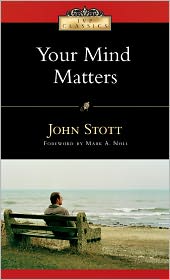
ybody who dared to walk into our bookstore during that grand opening, especially since we were new in town and our mix of general market books and ecumenical Christian books didn’t fit the mold of what some might have expected when they heard a Christian bookstore was coming to East Main Street. We couldn’t afford much, so it had to be small, and it couldn’t be too academic for our ordinary folks here in town. And any giveaway book needed to honor our desire to be fully Biblical and yet culturally engaged, to be willing to think and read and learn and yet not be haughty or dry. What better way to share the way Christ could be honored by a down-home, serious-minded bookstore than share Your Mind Matters: The Place of the Mind in the Christian Life by John Stott (IVP; $7.00.) I will explain a bit more, below, and how it warns against “spiritual superficiality.” It remains a quiet gem, a small book of balance and wisdom and urgency and hope and we smile thinking we chose a John Stott book as a way to help explain our mission here.
And this. Years ago a friend had organized a conference about faith in the marketplace, thinking about the implications of our Scriptural “first things” for every area of life and service in the world. The brochure featured a lengthy quote from a John Stott book, a book that, at that point in my life, I had not yet read. It was from Christian Mission in the Modern World, (IVP; $8.00) a book I have since re-read several times. It emerged from the historic Lausanne conference, and detailed a wholistic, balanced, and culturally-sensitive vision of evangelical mission. It remains an essential book for these global times. The quote, though, was important as a reminder that we are all missionaries; this was before the phrase “missional” was in use, but it captured that (dare I say Kuyperian) approach so well that I tore it off the brochure and used it as a book-marker in my Bible where it has been for over probably 25 years, now. I’ve quoted it often in talks and sermons and classes. It starts by poking the impression that was (and may still be today) sometimes given that those who are most “keen” for Christ should be a missionary or pastor or church worker. Stott opens up a more faithful, sensible (and, finally, radical) view of vocation and reminds us of this revolutionary dynamic which is too rarely explored.
It seems to me urgent to gain a truer perspective on this matter of vocation. Jesus Christ calls all his disciples to “ministry,” that is, to service. He himself is the Servant par excellence, and he calls us to be servants, too. This much then, is certain: if we are Christians we must spend our lives in the service of God and man. The only difference between us lies in the nature of the service we are called to render. Some are indeed called to be missionaries, evangelists or pastors, and others to the great professions of law, education, medicine and the social sciences. But others are called to commerce, to industry and farming, to accountancy and banking, to local government or parliament, and to the mass media, while there are still many who find their vocation in homemaking and parenthood without pursuing an independent career as well. In all these spheres, and in others besides, it is possible for Christians to interpret their lifework Christianly, and to see it as neither a necessary evil (necessary, that is, for survival), nor even as a useful place in which to evangelize or make money for evangelism, but as their Christian vocation, as the way Christ has called them to spend their lives in his service. Further, a part of their calling will be to seek to maintain Christ’s standards of justice, righteousness, honesty, human dignity and compassion in a society which no longer accepts them.
Stott continues in that same little book to call for conferences and meetings, inviting folks to join what he called “study-action” groups. He envisioned local community book clubs, reading together to help sharpen one another in our careers and civic lives. Oh how I wish more would take his wisdom to heart and start up such study-action groups. I guess you can see that it is no wonder that we have admired his work and mourn our loss.
Several really, really fine reflections on Stott and his work have appeared over these last few days. Some have really inspired me and I think they are a good testimony not only to God’s work through his humble servant John Stott, but also remind us of the need for a clear-headed, Christ-centered, Biblically-balanced, and socially-engaged Kingdom perspective. We in no way want to exploit or capitalize on his death. Yet, his books are very helpful and are still needed so very badly. A few readers have asked for a list, so I”ll share a few.
But first, a few helpful sources to learn about his life, influence, and ministry.
Interestingly, The New York Times obituary is one of the best.
Political pundit Mike Gerson was a Stott intern for a while and offers a very wise testimony to his vision and integrity. This is a fantastic example of how Stott’s view of a wholistic, balanced, thoughtful evangelicalism made a difference in a current leader. This tribute was recently published in the Capitol Commentary of CPJ. Very nicely done.Here is a short, basic, overview from Beliefnet.
The most extensive overview that we most highly recommend. A must read essay, from Christianity Today.
I really enjoyed this wonderful rumination from an eloquent preacher and Episcopalian priest, Fleming Rutledge.
From the left-leaning British paper, The Guardian. They get it. Very well put.

Where to begin? My, my. Here are my top fifteen, in no particular order.
Your Mind Matters to God (IVP) $7.00 I mentioned this above, naming it as a favorite, brief book about the need to honor God with our thinking, to have a robust intellectual commitment to the Scriptures and all of life, and to take up the call to “think Christianly” about life and culture. Also a good warning to never allow faith to be only intellectual and to avoid the dryness of an exclusive brainy sort of discipleship. This new edition carries a brief forward on the books significance by Mark Noll.
Christian Mission in the Modern World (IVP) $8.00 I cited this above; it was compiled from his legendary talks at the first Lausanne conference and is a model for balanced evangelic
al thinking about wholistic global missions. Still a brief masterpiece and as timely as ever.
The Radical Disciple: Some Neglected Aspects of Our Calling (IVP) $15.00 This compact sized hardback was announced as his last full book and he wanted it to be known as his “last lecture” or parting words. I read it I think in maybe two sittings. It is a reminder of the cost of discipleship, the need to relate faith to urgent issues of the day (such as climate change and issues of the two-thirds world.) He advises wisely against materialism and remains, as always, a “basic Christian” wanting to be found faithful in living faithfully, with great love and deep passion for the things of God’s Kingdom. Publishers Weekly gave it a fine review, noting it is “unadorned, threaded with Biblical reference…” It’s last word? Farewell!
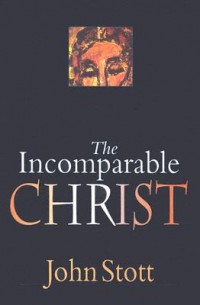 The Incomparable Christ (IVP) $18.00 We had the immense privilege of selling books in Washington DC as Stott delivered these lectures for the C.S. Lewis Institute a few years back and they remain in my mind as one of the great lectures series I have ever heard. In this one volume, Dr. Stott offers four angles into the life of Jesus, a New Testament overview (with a portrayal of Jesus from each section of the New Testament), an historical overview (with each chapter telling of a view of Jesus held by someone down through church history, including a few non-Christians, showing how Christ has been understood and presented), a third section called “The Influential Jesus” or how he has inspired people down throughout history–great, great stories and testimonies here— and a final section with chapters showing Jesus in various portions of the book of Revelation. What an inspiring, wide-ranging, and under-rated volume this is! I think if I was going to a desert island and could only take a few books, this would be my one choice about Jesus.
The Incomparable Christ (IVP) $18.00 We had the immense privilege of selling books in Washington DC as Stott delivered these lectures for the C.S. Lewis Institute a few years back and they remain in my mind as one of the great lectures series I have ever heard. In this one volume, Dr. Stott offers four angles into the life of Jesus, a New Testament overview (with a portrayal of Jesus from each section of the New Testament), an historical overview (with each chapter telling of a view of Jesus held by someone down through church history, including a few non-Christians, showing how Christ has been understood and presented), a third section called “The Influential Jesus” or how he has inspired people down throughout history–great, great stories and testimonies here— and a final section with chapters showing Jesus in various portions of the book of Revelation. What an inspiring, wide-ranging, and under-rated volume this is! I think if I was going to a desert island and could only take a few books, this would be my one choice about Jesus.
The Cross of Christ (IVP) $26.00 I often complain when publishers keep books in hardcover,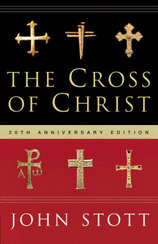 wishing they would offer less expensive paperback versions. For some reason, though, I enjoy holding this hefty hardback, realizing it may be Stott’s most important, somewhat scholarly, contribution to Christian theology. It truly is a modern classic, a lucid, multi-faceted and faithful text and the hardback presentation reminds us of its gravity. One can hardly be fluent in the various debates and discussions about the role of the Cross without this fine touchstone. J. I. Packer says that it is “his masterpiece.” It very well may be.
wishing they would offer less expensive paperback versions. For some reason, though, I enjoy holding this hefty hardback, realizing it may be Stott’s most important, somewhat scholarly, contribution to Christian theology. It truly is a modern classic, a lucid, multi-faceted and faithful text and the hardback presentation reminds us of its gravity. One can hardly be fluent in the various debates and discussions about the role of the Cross without this fine touchstone. J. I. Packer says that it is “his masterpiece.” It very well may be.
The Contemporary Christian: Applying God’s Word to Today’s World (IVP) $25.00 Earlier, above, I wrote about the new book collecting various pieces from forty years of the Christian Scholars Review, saying it was like a “greatest hits” album from that journal. Well, although these chapters are not a reprinting of previous work, this may be considered Stott’s greatest hits. He covers nearly anything and everything a follower of Christ needs to know, offering solid theology and accessible, no-nonsense prose to guide you to deeper faith and fidelity. He explores nearly all the themes that are most essential to his approach and it is all good. The sections under which he has several informative chapters each, are The Gospel, The Disciple, The Bible, The Church, The World. It may be that this is his most quintessential, thorough study. I cannot recommend it more highly.
Issues Facing Christians Today (Zondervan) $19.99 This book has a colorful history–it was once published as two volumes, then as one, they changed the titles a few times, in England and the States, and it ended up with as an expanded, one-volume edition with a new title and a new publisher. The first half is essentially everything one might need to know to begin the journey towards faithful, evangelical engagement with social concern. This part is worth the price of the whole book and is wiser than most books that are more splashy and more hip. (His care about offering a vibrant but humble witness, his remarks on pluralism and rejecting the lack of civility of the culture wars, are all true insights and very helpful.) He invites us to patient, careful, consideration of the basic contours of the Christian mind, reminding us always that in the past there have been great social reforms inspired by great spiritual revival. (Think of the Wesleyan renewal and Wilberforce, for instance.)
The second half of this large paperback offers a preliminary Biblical perspective on a range of issues, public matters from genetic engineering to nuclear weapons, from same sex marriage to labor relations. He is a “conservative radical” as he liked to say, orthodox on faith and consistent in attempting to offer hints towards a faithful social vision. Agree or not with his views on abortion or environmentalism or war and peace, it is a stunning effort, a fabulous resource, and a book that simply must be considered and discussed. Those looking for a balanced approach to social ethics and contemporary issues that are not necessarily lock-step conservative or liberal will delight in this fabulous study.
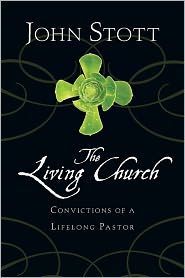
The Bible Speaks Today: The Message of the Sermon on the Mount (IVP) $18.00 Formerly entitled Christian Counter-Culture it is a fine, workmanlike commentary with a bit of practical application. Although Stott was a pacifist and conscientious objector earlier in his career—and an anti-nuclear weapons advocate late in his career—this commentary doesn’t indicate much of those concerns, which always made wish Uncle John had been a bit more radical in this study. Still, it is one of the better introductory commentaries and we regularly suggest it.
The Bible Speaks Today: The Message of Acts (IVP) $20.00 Stott has served as Senior Editor for the New Testament for this whole Bible commentary set and his own previously titled Acts commentary from 1991 The Spirit, the Church & the W
orld has been retitled and now serves as the Acts volume in this set. Very impressive. Again, Stott had this ability to do standard exegesis and Bible exposition in a way that took culture and mission seriously.
The Bible Speaks Today: The Message of Ephesians (IVP) $19.00 Again, this volume in the set was penned by Stott himself. I think this may have been the first Bible commentary I ever read; my father had the Barclay’s commentaries which I maybe dipped into, but this—a stand alone volume firstly called God’s New Society–capture my attention in the late 70s. He opens it with a reminder that Karl Marx had a vision of a new person for a new society and writes, “Paul presents a greater vision still.” This is the sort of solid (and culturally alive) Bible study that kept me a Christian.
The Bible Speaks Today: The Message of Romans (IVP) $20/00 Ooops, I don’t think I’ve ever read this. I am inspiring myself to do so; maybe you too? Look, there are tons of books on nearly every book of the Bible and some are more scholarly and some more devotional and some more edgy and some more this or that or the other. Stott is reliable, evangelical, practical. One can hardly go wrong, even if he wrote this before he talked it over with N.T. Wright. Ha. Give it a try.
Baptism and Fullness: The Work of the Holy Spirit Today (IVP) $8.00 There was a time in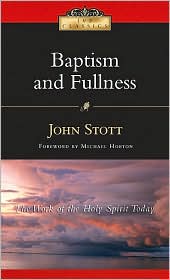
Between Two Worlds: The Challenge of Preaching Today (Eerdmans) $24.00 I know, not everybody wants to read a book about how to preach. (Although, no offense, but some of you preachers, uh, maybe should.) If you want to brush up on your homiletics, this is a fine, classic resource. And you know what? It is really for anyone because his major point is that we need a double listening, listening to the Word and the world. And that requires some translation, some experience with the art of contextualization, making the ancient culture’s story come alive in our own. As is often the case, good books about preaching are also good books about Biblical interpretation and good books about Christian living. This is one of those, helpful for one and all. It was called “exhilarating” by David Read, the minister of Madison Avenue Presbyterian Church. Highly recommended.
 The Birds Our Teachers (Collector’s Edition): Biblical Lessons From a Lifelong Bird-Watcher John Stott (Hendrickson) $24.95 When we heard that this beloved gift book was coming out in with a CD loaded with Stott’s own pictures of his 70th birthday bird-watching trip to the Falkland Islands (insider hint: penguins live there!) and an audio recording as well, we were so, so tickled. Many people just loved this book before it went out of print, a handsome, full-color gift book with Stott devotionals and all manner of things about his beloved feathered friends. As I hope you saw in any number of the obits, he was a lay ornithologist. The title comes from Luther’s exhortation “Let the little birds be your theologians” and Stott, indeed, does reveal lessons of faith from ravens, storks, larks and eagles. So glad it is now available again in this enhanced edition.
The Birds Our Teachers (Collector’s Edition): Biblical Lessons From a Lifelong Bird-Watcher John Stott (Hendrickson) $24.95 When we heard that this beloved gift book was coming out in with a CD loaded with Stott’s own pictures of his 70th birthday bird-watching trip to the Falkland Islands (insider hint: penguins live there!) and an audio recording as well, we were so, so tickled. Many people just loved this book before it went out of print, a handsome, full-color gift book with Stott devotionals and all manner of things about his beloved feathered friends. As I hope you saw in any number of the obits, he was a lay ornithologist. The title comes from Luther’s exhortation “Let the little birds be your theologians” and Stott, indeed, does reveal lessons of faith from ravens, storks, larks and eagles. So glad it is now available again in this enhanced edition.
AND A DVD
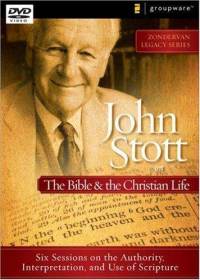 DVD John Stott on the Bible and the Christian Life (Zondervan) $19.99 Here are six nearly hour-long sessions, with Dr. Stott in his orderly, clear, dispassionate teaching, lecturing live at All Souls. In the six sessions he holds forth with impeccable insight on The Authority of the Bible, The Nature of the Bible’s Authority, The Interpretation of the Bible, The Problem of Culture, Developing a Christian Mind, and Making an Impact on Society. I’ve used these myself to good effect and many serious folks have found them very, very helpful. For what it is worth, the six sessions could easily be expanded to twelve as there is plenty to absorb and good discussion questions offered throughout. By the way, if you are involved in leading programing, doing ministry or teaching, it doesn’t hurt to have this around—I’ve used just one lecture, or even on portion, to supplement a class or retreat.
DVD John Stott on the Bible and the Christian Life (Zondervan) $19.99 Here are six nearly hour-long sessions, with Dr. Stott in his orderly, clear, dispassionate teaching, lecturing live at All Souls. In the six sessions he holds forth with impeccable insight on The Authority of the Bible, The Nature of the Bible’s Authority, The Interpretation of the Bible, The Problem of Culture, Developing a Christian Mind, and Making an Impact on Society. I’ve used these myself to good effect and many serious folks have found them very, very helpful. For what it is worth, the six sessions could easily be expanded to twelve as there is plenty to absorb and good discussion questions offered throughout. By the way, if you are involved in leading programing, doing ministry or teaching, it doesn’t hurt to have this around—I’ve used just one lecture, or even on portion, to supplement a class or retreat.
SPECIAL
DISCOUNT
– any book mentioned –
The regular retail prices are shown above. We will deduct the discount from those prices.
20% off
order here
takes you to the secure Hearts & Minds order form page
inquire here
if you have questions or need more information
